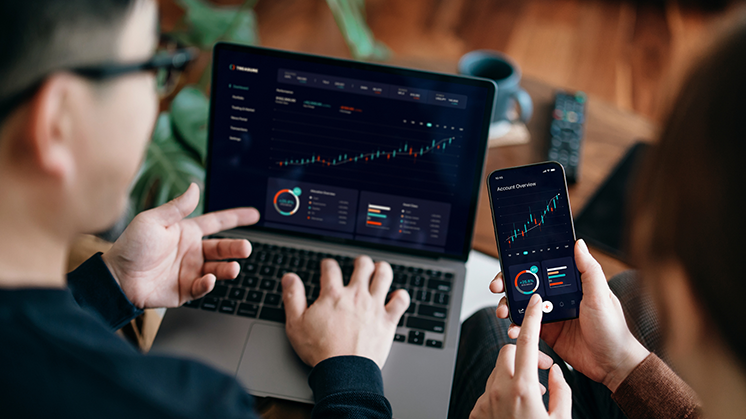
Some ASX-listed companies were affected by higher costs this earnings season. Perpetual’s deputy head of equities, Anthony Aboud, explains how to look for companies that are well suited to this environment.
- Consumer spending holding up
- Be cautious with big-spending companies
- Find out about Perpetual’s Australian equities capabilities
Equities investors should keep a close eye on companies with a lot of debt after higher interest rates cut into earnings this year, says Perpetual’s Anthony Aboud.
Rising costs affected corporate earnings across the ASX this year, as companies battled higher wages, steep rent increases and rising costs in cyber security and digital and data development.
But interest rates caused the most concern, says Aboud, Perpetual’s deputy head of equities.
Blue chips Ramsay Healthcare, Endeavour Group and Amcor were among companies posting higher interest bills that surprised analysts.
“When it goes from being an earnings issue to all of a sudden being a balance sheet issue — that’s what the market doesn't like,” says Aboud.
“We feel this is an important thematic over the next six to 12 months as the analysts and the markets really get their heads around businesses that have got balance sheet risk.”
Aboud says investors should keep a close eye on corporate balance sheets and capital spending requirements over the coming year.
“It’s not just the amount of debt you’ve got — it’s the operating leverage of your business. It's about working capital needs. It’s about the capital expenditure it needs,” he says.
“We’ve gone through a couple of years where a lot of capital projects have been pushed back. Now, capex guidance has surprised on the upside.
“Highly capital-intensive companies with a decently geared balance sheets that are not getting any top line growth — that’s where you’ve got to watch out.”
Labour costs
It was clear going in to reporting season that higher labour costs were a headwind for profits.
But it’s been surprising to find some companies that traditionally had pricing power have found it more difficult to push through price rises.
“At the half-year, Ramsay indicated they were able to recoup some of the labour-cost inflation by passing on to the private health insurers who are their payers.
“But now they are stepping back from that.”
Consumer demand holds up
Aboud says overall demand has come in better than feared, belying market negativity ahead of earnings season.
“In Australia, everyone was focused on the roll-off from fixed-price mortgages to higher interest rates.
“There was a perception that the consumer economy was about to fall off a cliff.
“Feedback has been that hasn’t been the case.
“There’s definitely been a softening from the consumer, and there's definitely some evidence of people buying cheaper products and economising a little bit, but the economy is still not too bad.”
Where to hunt
How can investors try to protect portfolios from rising cost pressures?
Aboud says the key is to give bigger weight to companies with lower capital intensity.
“You want to find companies with less capital intensity because your cost of building stuff, cost of labour and materials, has got much higher so you're pumping money into lower-returning assets.”
One example is IPH (ASX: IPH), the intellectual property services firm specialising in patents and trademarks.
“There’s virtually no capital expenditure — the earnings are paid out 100 per cent,” says Aboud.
Another is Deterra Royalties (ASX: DRR), a pure royalty company that has no capex requirements.
Short positions
A second option for managing rising costs is adding short positions to a portfolio.
“The way we protect a portfolio from this sort of environment is to identify companies where we feel the market is underestimating the cost of inflation.
“We're also looking at companies with already over-geared balance sheets.
“There are a heap of companies that have just made long-term capital decisions based on zero or very low interest rates.
“I'm trying to identify those companies where their business model and capital management decisions are predicated on zero or very low interest rates.
“We've identified quite a few where we feel the capital structure is wrong for having to borrow at 6 or 7 per cent.”
Invest with billionaire funders
Aboud also recommends investing alongside billionaire founders as a way to navigate potential trouble.
“Whenever we’re going through a downturn, we always find out these billionaire founders have a very strong balance sheet.
“Right now, Premier Investment’s (ASX: PMV) Solomon Lew is going into this downturn with half a billion dollars in cash.
“You want you want to be in companies that have great balance sheets and are run by people who are going to take advantage of the downturn, to be able to swoop on weaker players.”
Aboud nominates Eagers Automotive (ASX: APE), the country’s biggest car dealership led by billionaire Nick Politis, and EVT Ltd (ASX: EVT), the Alan Rydge-family controlled conglomerate that owns hotels, cinema and the Thredbo ski resort.
About Perpetual’s Australian equities team
Perpetual is a pioneer in Australian quality and value investing, with a heritage dating back to 1886.
We have a track record of contributing value through “active ownership” and deep research.
Find out more about Perpetual’s Australian equities capabilities
Want to find out more? Contact a Perpetual account manager

